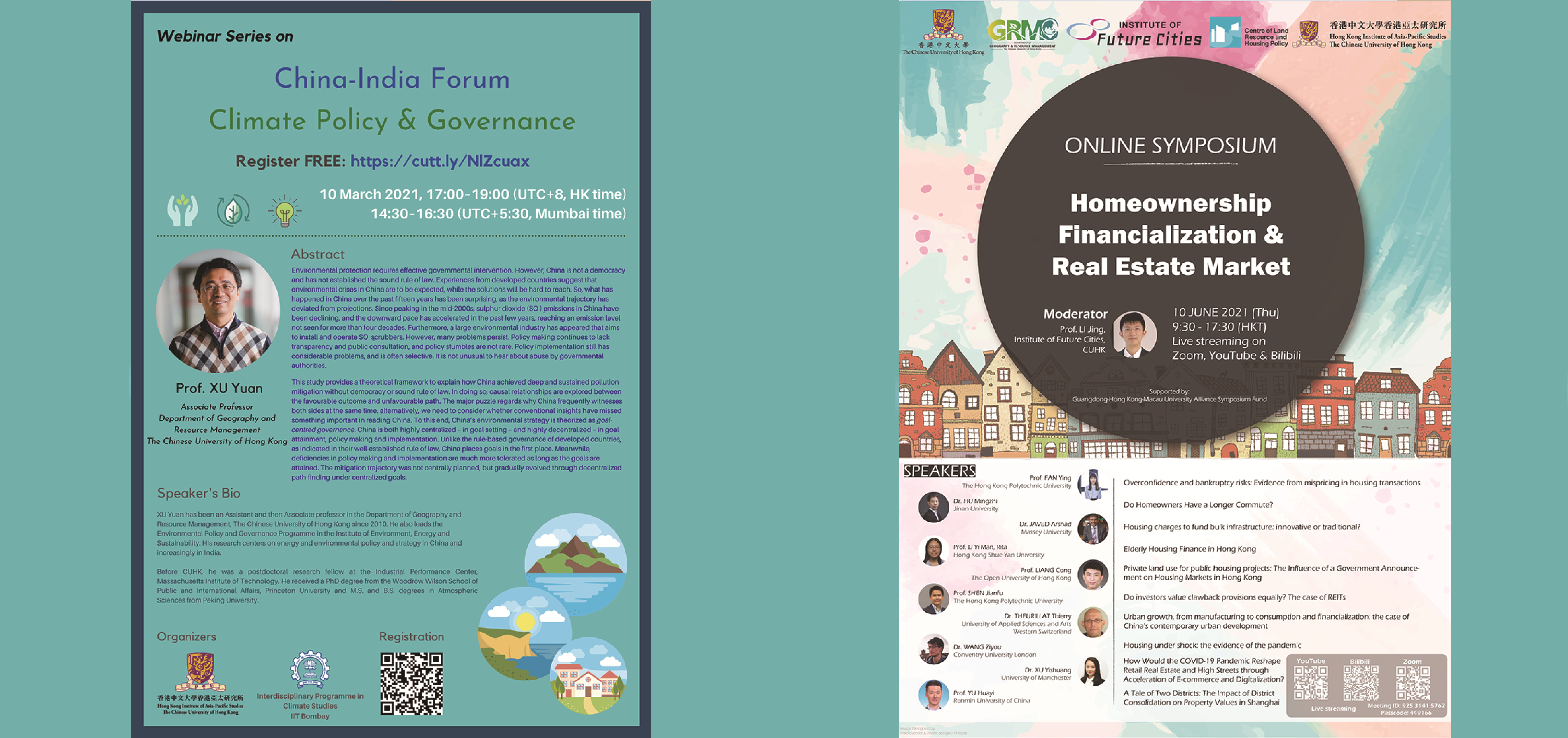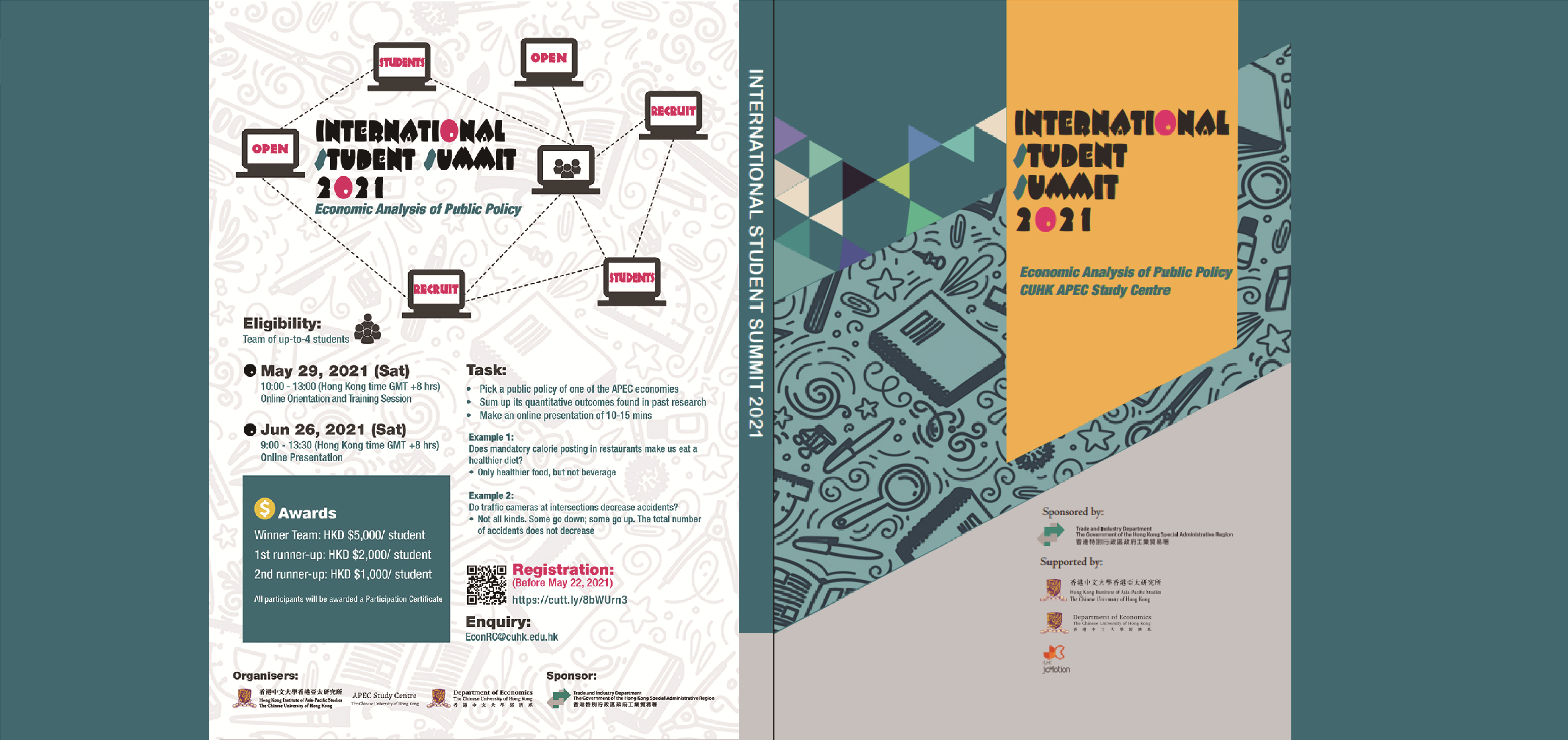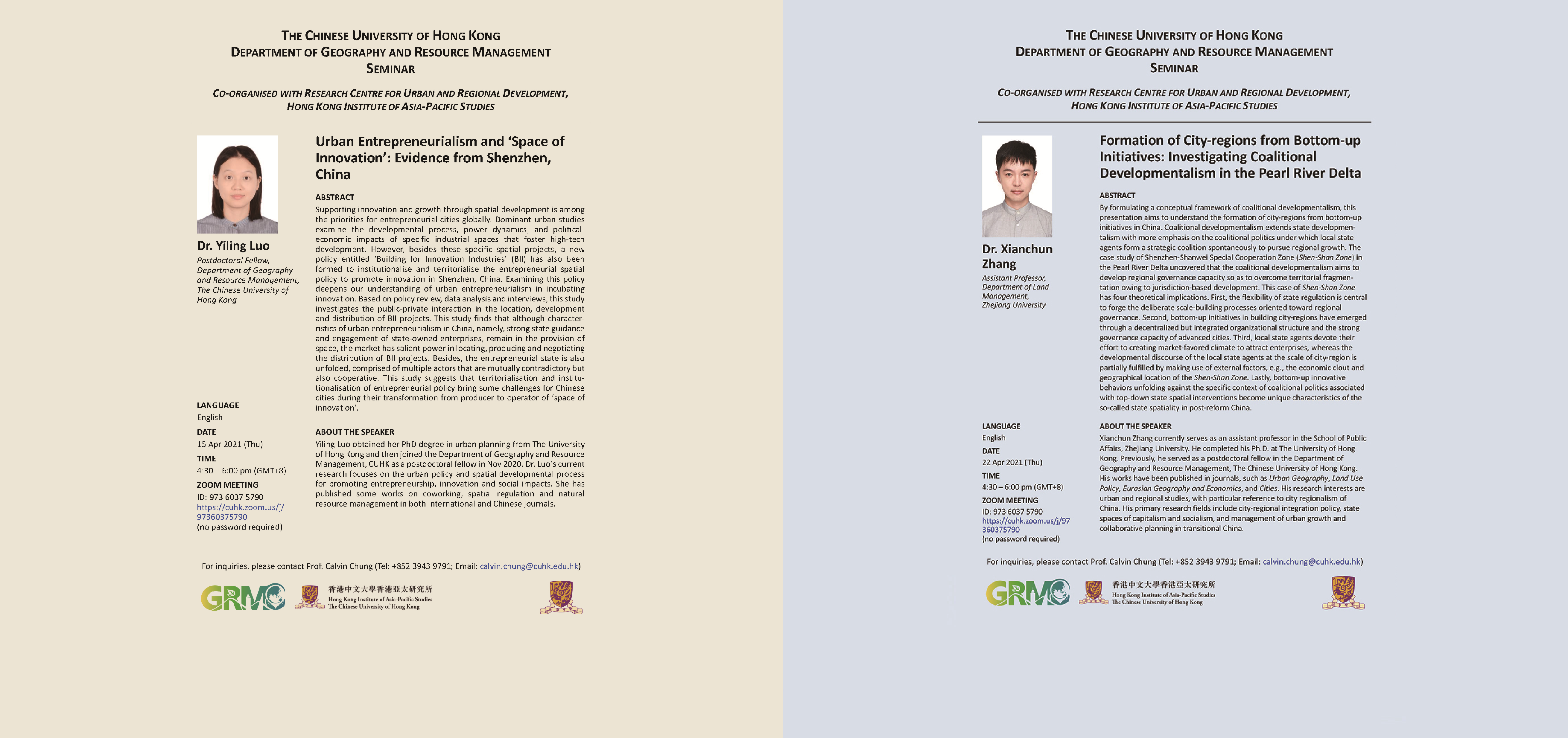
|
| Seminars |
|
|
| HKIAPS | Centre for Chinese Family Studies |
Centre for Social Innovation Studies |
Centre for Youth Studies |
| Economic Reseach Centre |
Gender Reseach Centre |
Research Centre for Urban and Regional Development |
Policy Research @ HKIAPS |
|
Speaker
Prof. Yuan Xu |
Associate Professor, Department of Geography and Resource Management, CUHK |
|
Co-organizer
Interdisciplinary Programme in Climate Studies, Indian Institute of Technology Bombay |
|
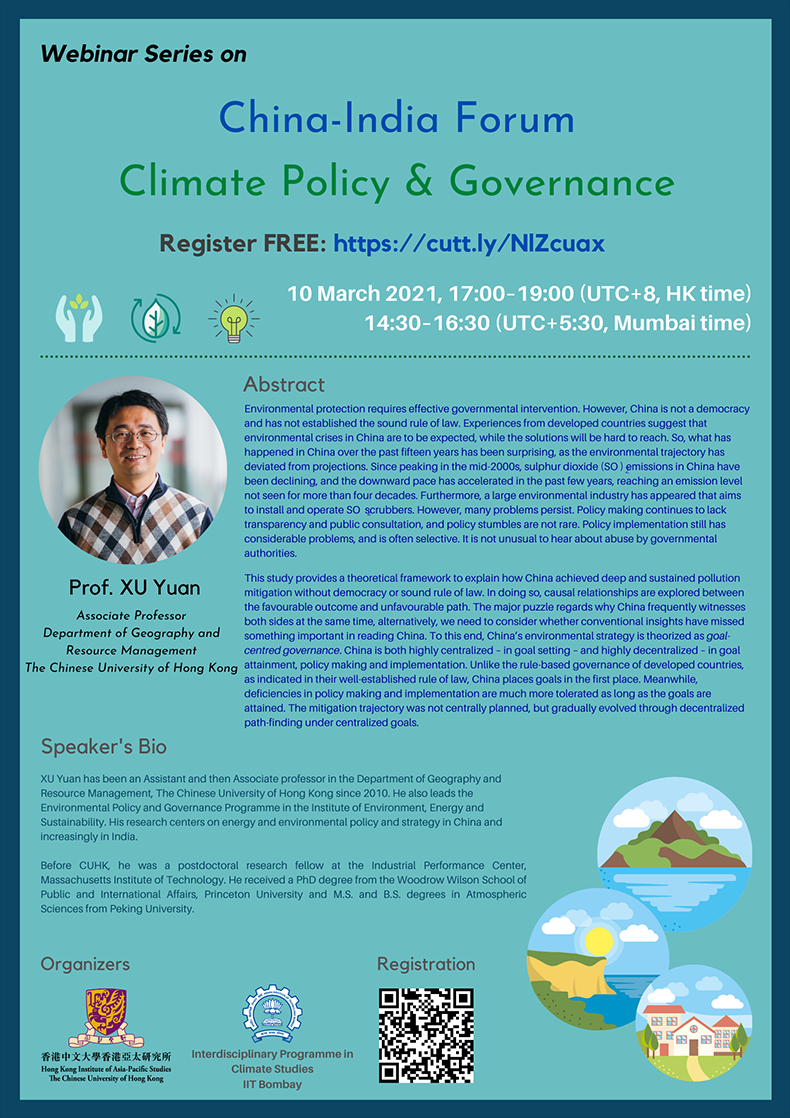 Environmental protection requires effective governmental intervention.
However, China is not a democracy and has not established a sound rule of law.
Experience from developed countries suggest that environmental crises in China are to be expected,
while the solutions will be hard to achieve.
Therefore, what has happened in China over the past fifteen years has been surprising as the environmental trajectory has deviated from projections.
Sulphur dioxide (SO2) emissions in China have been in steady decline from their peak in the mid-2000s,
and the downward pace has accelerated in the past few years,
reaching an emission level not seen for more than four decades.
Furthermore, a large environmental industry has appeared that aims to install and operate SO2 scrubbers.
However, many problems persist. Policy making continues to lack transparency and public consultation,
and policy stumbles are not rare. The result is that policy implementation still has considerable problems,
and is often selective. Furthermore, it is not unusual to hear about abuse by governmental authorities.
Environmental protection requires effective governmental intervention.
However, China is not a democracy and has not established a sound rule of law.
Experience from developed countries suggest that environmental crises in China are to be expected,
while the solutions will be hard to achieve.
Therefore, what has happened in China over the past fifteen years has been surprising as the environmental trajectory has deviated from projections.
Sulphur dioxide (SO2) emissions in China have been in steady decline from their peak in the mid-2000s,
and the downward pace has accelerated in the past few years,
reaching an emission level not seen for more than four decades.
Furthermore, a large environmental industry has appeared that aims to install and operate SO2 scrubbers.
However, many problems persist. Policy making continues to lack transparency and public consultation,
and policy stumbles are not rare. The result is that policy implementation still has considerable problems,
and is often selective. Furthermore, it is not unusual to hear about abuse by governmental authorities. |
|
|
Speakers
Prof. Ying Fan |
Assistant Professor, Department of Building and Real Estate, The Hong Kong Polytechnic University |
|
Dr Mingzhi Hu
|
Associate Professor, School of Management & Chinese Academy of Housing and Real Estate,
Zhejiang University of Technology, China
|
|
Dr Arshad Javed |
Senior Lecturer in Property, Massey University, New Zealand
|
|
Prof. Rita Y. M. Li
|
Director, Sustainable Real Estate Research Center,
Hong Kong Shue Yan University |
|
Prof. Gong Liang
|
Research Assistant Professor, Lee Shau Kee School of Business and Administration,
The Open University of Hong Kong
|
|
Dr Thierry Theurillat
|
Lecturer and Senior Researcher, Management Institute for Cities and Territories,
University of Applied Sciences and Arts Western Switzerland
|
|
Prof. Jianfu Shen
|
Assistant Professor, Department of Building and Real Estate,
The Hong Kong Polytechnic University |
|
Dr Ziyou Wang
|
Lecturer in Financial Economics,
Conventry University London, United Kingdom |
|
Dr Yishuang Xu |
Lecturer in Real Estate, University of Manchester,
United Kingdom
|
|
Prof. Huayi Yu
|
Associate Professor, School of Public Administration and Policy,
Renmin University of China |
|
Moderator
Prof. Jing V. Li |
Deputy Director, Centre of Land Resource and Housing Policy, IOFC
|
|
Co-organizer
Department of Geography and Resource Management, CUHK Centre of Land Resource and Housing Policy, Institute of Future Cities, CUHK |
|
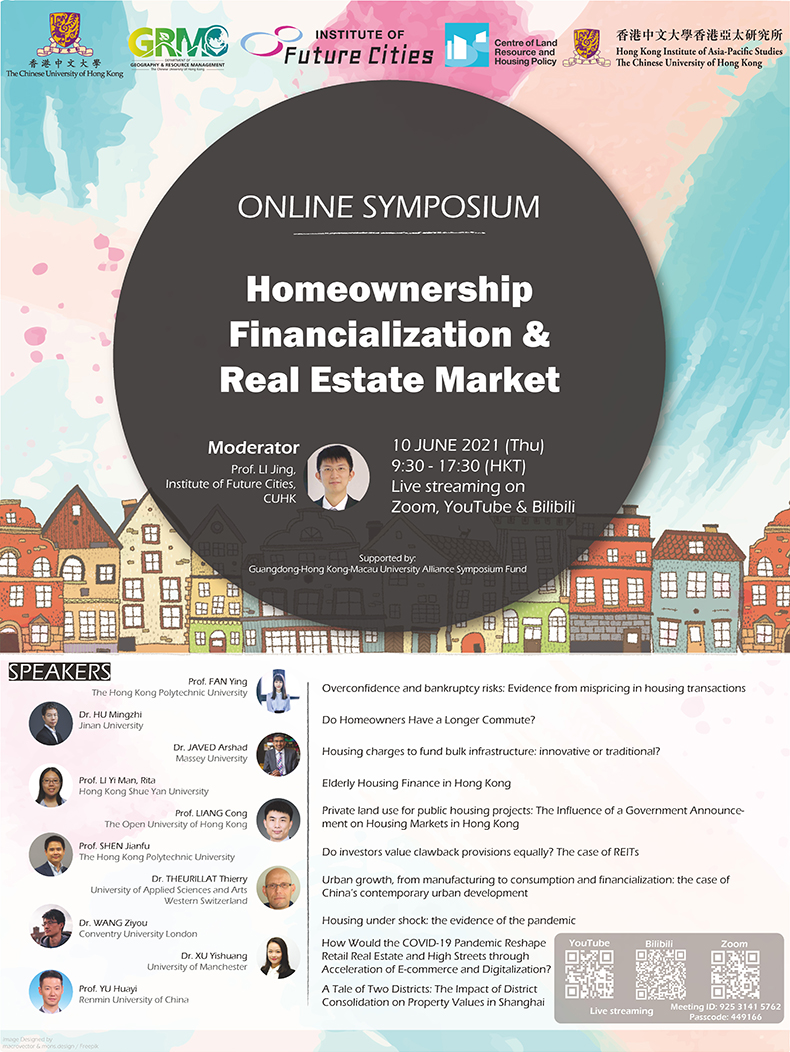 Ten speakers shared their viewpoints on specific topics concerning the real estate market.
The topics included overconfidence and bankruptcy risks,
whether homeowners are having longer commutes,
housing charges to fund bulk infrastructure,
elderly housing finance in Hong Kong,
the influence of a government announcement on housing markets in Hong Kong,
whether investors value clawback provisions equally,
the case of China’s contemporary urban development to illustrate urban growth,
housing shocks under the pandemic,
evaluating how the COVID-19 pandemic could reshape retail real estate and high streets through acceleration of e-commerce and digitalization,
and elaborate the impact of district consolidation on property values in Shanghai.
The online symposium playback video: https://www.youtube.com/watch?v=XA24DnXjYC4
Ten speakers shared their viewpoints on specific topics concerning the real estate market.
The topics included overconfidence and bankruptcy risks,
whether homeowners are having longer commutes,
housing charges to fund bulk infrastructure,
elderly housing finance in Hong Kong,
the influence of a government announcement on housing markets in Hong Kong,
whether investors value clawback provisions equally,
the case of China’s contemporary urban development to illustrate urban growth,
housing shocks under the pandemic,
evaluating how the COVID-19 pandemic could reshape retail real estate and high streets through acceleration of e-commerce and digitalization,
and elaborate the impact of district consolidation on property values in Shanghai.
The online symposium playback video: https://www.youtube.com/watch?v=XA24DnXjYC4 |
|
|
Speaker
Prof. Haijing Dai |
Co-Director, CCFS, HKIAPS, CUHK
|
|
Co-organizer
Department of Sociology, CUHK |
|
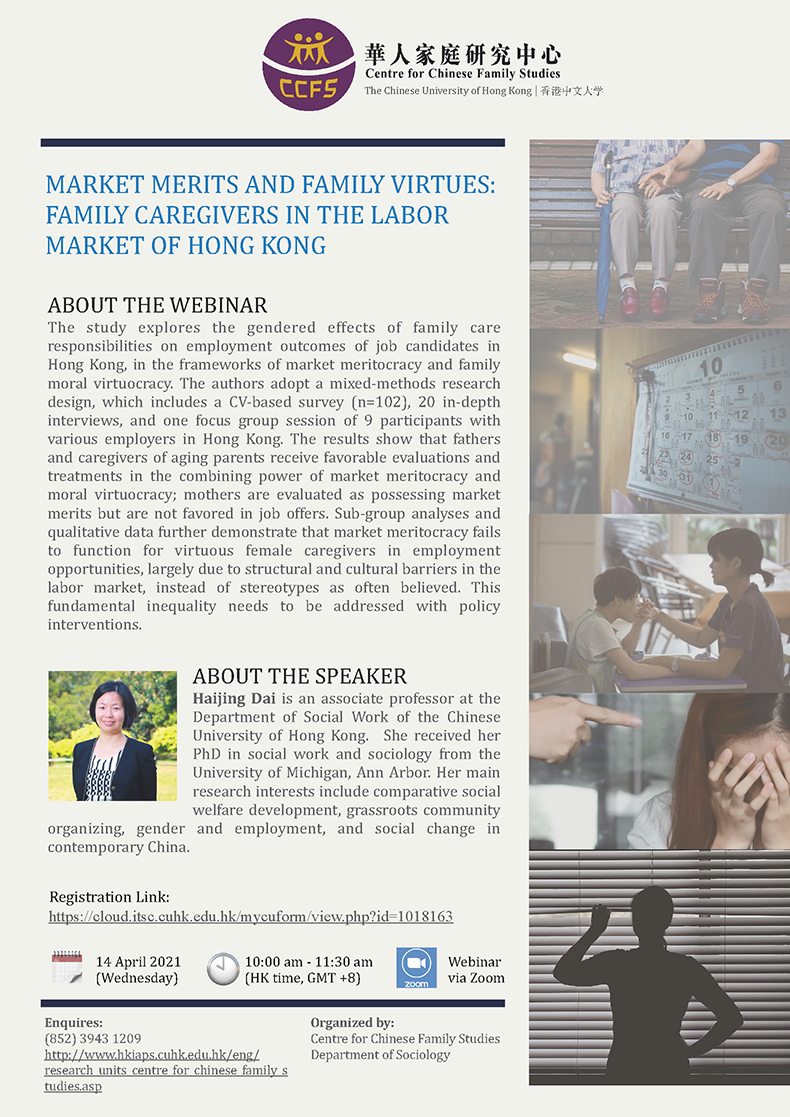 This study explores the gendered effects of family care responsibilities on employment outcomes of job candidates in Hong Kong,
in the frameworks of market meritocracy and family moral virtuocracy.
The authors adopt a mixed-methods research design, which includes a CV-based survey (n=102),
20 in-depth interviews, and one focus group session of nine participants with various employers in Hong Kong.
The results show that fathers and caregivers of aging parents receive favourable evaluations and treatment in the combined power of market meritocracy and moral virtuocracy;
mothers are evaluated as possessing market merit, but are not favoured in job offers.
Sub-group analyses and qualitative data further demonstrate that market meritocracy fails to function for virtuous female caregivers in employment opportunities,
largely due to structural and cultural barriers in the labour market, instead of stereotypes as often believed.
This fundamental inequality needs to be addressed with policy interventions.
This study explores the gendered effects of family care responsibilities on employment outcomes of job candidates in Hong Kong,
in the frameworks of market meritocracy and family moral virtuocracy.
The authors adopt a mixed-methods research design, which includes a CV-based survey (n=102),
20 in-depth interviews, and one focus group session of nine participants with various employers in Hong Kong.
The results show that fathers and caregivers of aging parents receive favourable evaluations and treatment in the combined power of market meritocracy and moral virtuocracy;
mothers are evaluated as possessing market merit, but are not favoured in job offers.
Sub-group analyses and qualitative data further demonstrate that market meritocracy fails to function for virtuous female caregivers in employment opportunities,
largely due to structural and cultural barriers in the labour market, instead of stereotypes as often believed.
This fundamental inequality needs to be addressed with policy interventions. |
|
|
Speaker
Prof. Feinian Chen |
Professor, Department of Sociology,
University of Maryland, U.S.
|
|
Co-organizer
Department of Sociology, CUHK |
|
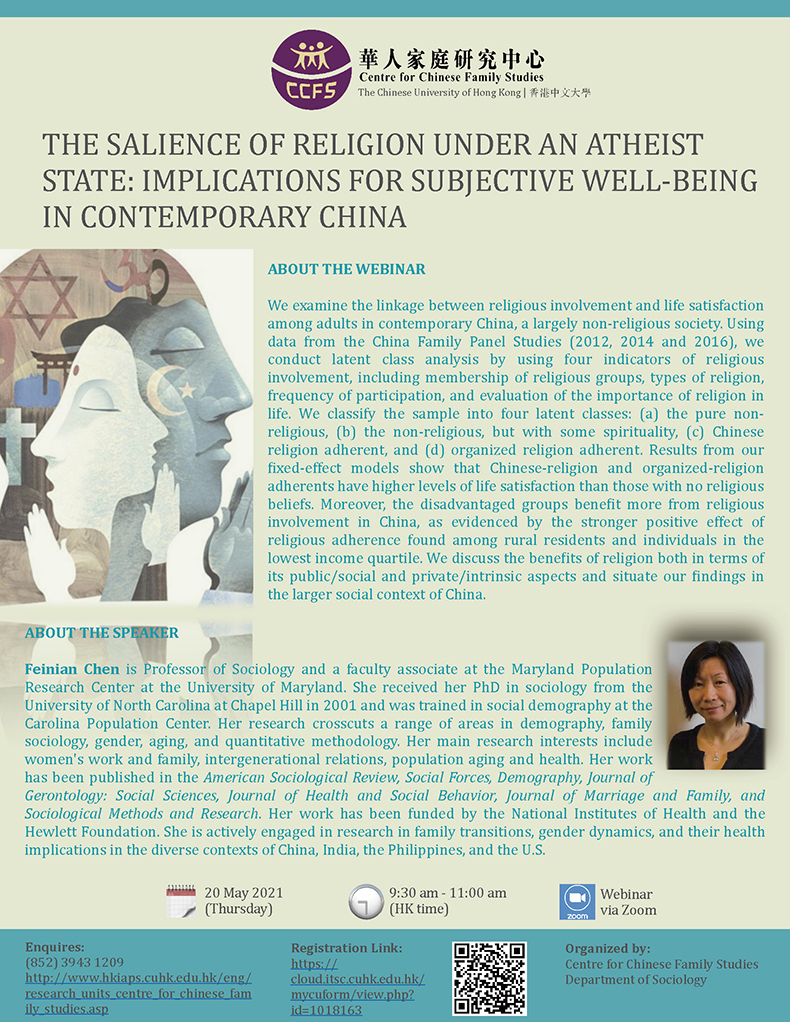 We examine the link between religious involvement and life satisfaction among adults in contemporary China,
a largely non-religious society. Using data from the China Family Panel Studies (2012, 2014 and 2016),
we conduct latent class analysis by using four indicators of religious involvement,
including membership of religious groups, types of religion, frequency of participation,
and evaluation of the importance of religion in life.
We classify the sample into four latent classes:
(a) the pure non-religious,
(b) the non-religious, but with some spirituality,
(c) Chinese religion adherent,
and (d) organized religion adherent.
Results from our fixed-effect models show that Chinese-religion and organized-religion adherents have higher levels of life satisfaction than those with no religious belief.
Moreover, disadvantaged groups in China benefit more from religious involvement,
as evidenced by the stronger positive effect of religious adherence found among rural residents and individuals in the lowest income quartile.
We discuss the benefits of religion both in terms of its public/social and private/intrinsic aspects and situate our findings in the larger social context of China.
We examine the link between religious involvement and life satisfaction among adults in contemporary China,
a largely non-religious society. Using data from the China Family Panel Studies (2012, 2014 and 2016),
we conduct latent class analysis by using four indicators of religious involvement,
including membership of religious groups, types of religion, frequency of participation,
and evaluation of the importance of religion in life.
We classify the sample into four latent classes:
(a) the pure non-religious,
(b) the non-religious, but with some spirituality,
(c) Chinese religion adherent,
and (d) organized religion adherent.
Results from our fixed-effect models show that Chinese-religion and organized-religion adherents have higher levels of life satisfaction than those with no religious belief.
Moreover, disadvantaged groups in China benefit more from religious involvement,
as evidenced by the stronger positive effect of religious adherence found among rural residents and individuals in the lowest income quartile.
We discuss the benefits of religion both in terms of its public/social and private/intrinsic aspects and situate our findings in the larger social context of China. |
|
|
Active Response to Population Aging in China:
Rural Vitalization and Toilet Revolution
24 June 2021 | Online |
|||||||||
|
Speaker
Prof. Feng Qiushi |
Associate Professor, Department of Sociology and Centre for Family and Population Research (CFPR), National University of Singapore
|
Co-organizer
Department of Sociology, CUHK
|
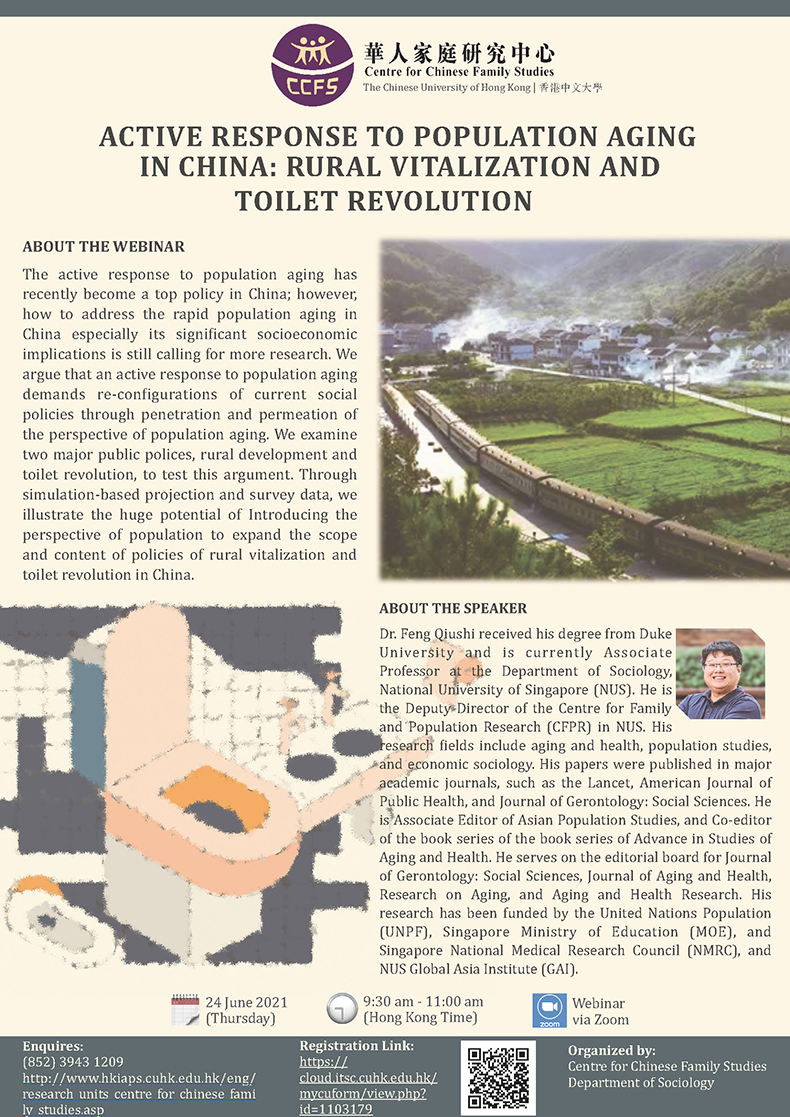 Actively responding to population aging has recently become a top policy priority in China;
however, how to address rapid population aging in China,
especially its significant socioeconomic implications,
is still calling for more research.
We argue that an active response to the socioeconomic implications demands a reconfiguration of current social policies through the perspective of population aging.
We examine two major public polices,
rural development and toilet revolution,
to test this argument.
Through simulation-based projection and survey data,
we illustrate the huge potential of introducing the perspective of population aging to expand the scope and content of policies of rural vitalization and toilet revolution in China.
Actively responding to population aging has recently become a top policy priority in China;
however, how to address rapid population aging in China,
especially its significant socioeconomic implications,
is still calling for more research.
We argue that an active response to the socioeconomic implications demands a reconfiguration of current social policies through the perspective of population aging.
We examine two major public polices,
rural development and toilet revolution,
to test this argument.
Through simulation-based projection and survey data,
we illustrate the huge potential of introducing the perspective of population aging to expand the scope and content of policies of rural vitalization and toilet revolution in China.
| | |||||
|
Speaker
Prof. Janaki Srinivasan |
Assistant Professor, the International Institute of Information Technology Bangalore, India |
|
Co-organizer
Fairwork |
|
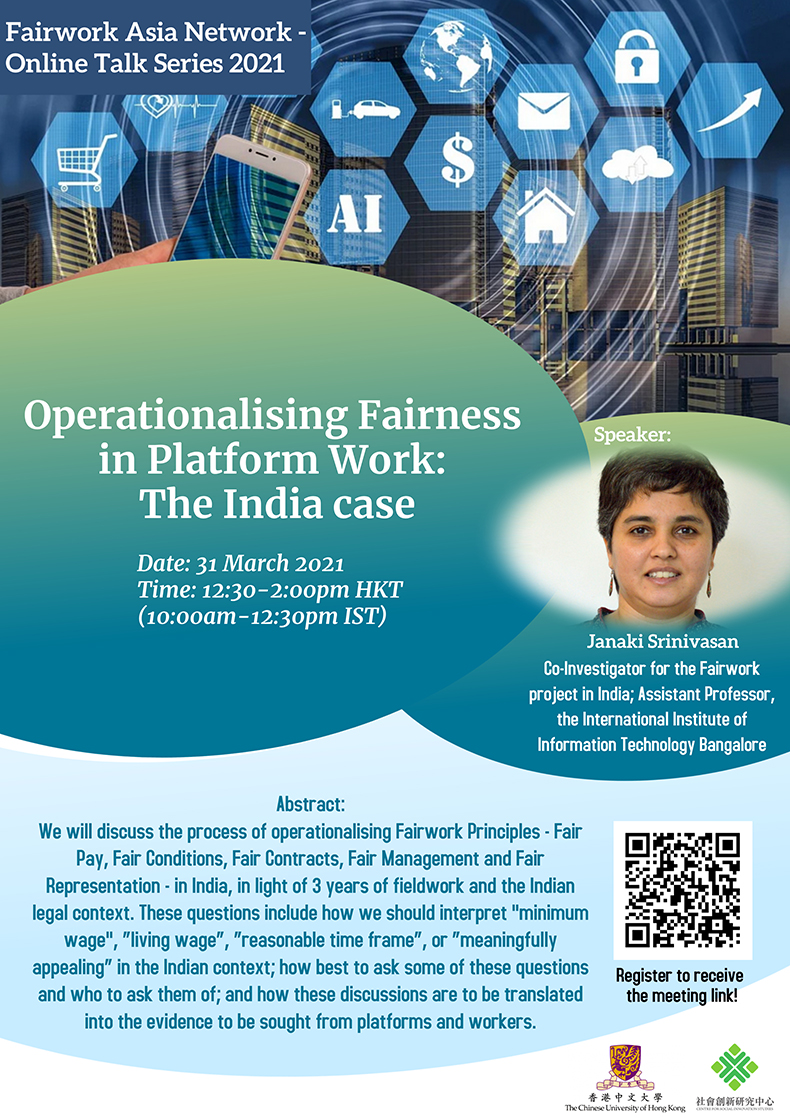 Drawing on three years of fieldwork and the Indian legal context,
we will discuss the process of operationalising the five Fairwork Principles -
Fair Pay, Fair Conditions, Fair Contracts, Fair Management and Fair Representation.
These questions include how we should interpret “minimum wage”, “living wage”, “reasonable time frame”,
or “meaningfully appealing” in the Indian context;
how best to ask some of these questions and who to ask them of;
and how these discussions are to be translated into the evidence to be sought from platforms and workers.
Drawing on three years of fieldwork and the Indian legal context,
we will discuss the process of operationalising the five Fairwork Principles -
Fair Pay, Fair Conditions, Fair Contracts, Fair Management and Fair Representation.
These questions include how we should interpret “minimum wage”, “living wage”, “reasonable time frame”,
or “meaningfully appealing” in the Indian context;
how best to ask some of these questions and who to ask them of;
and how these discussions are to be translated into the evidence to be sought from platforms and workers. |
|
|
Speaker
Prof. Geoffrey Pleyers |
Professor, Faculty of Economic, Social and Political Sciences and Communication,
Université catholique de Louvain, Belgium
|
|
Co-organizer
Department of Sociology, CUHK |
|
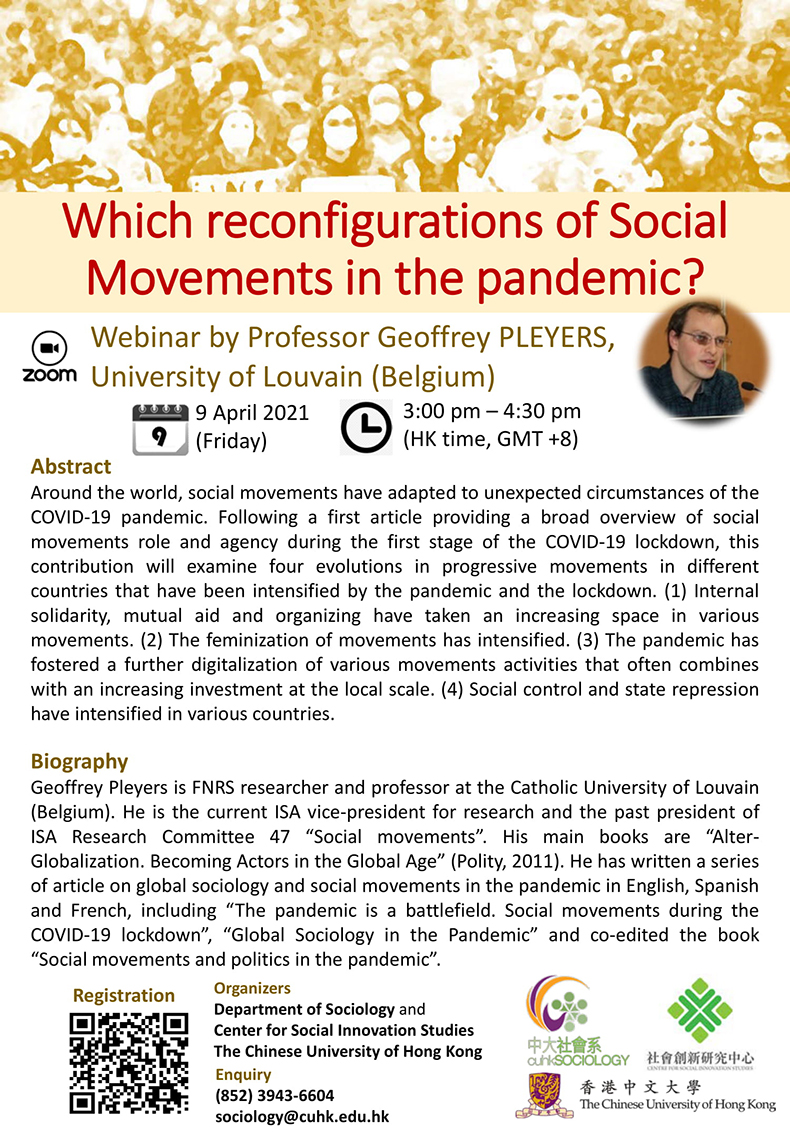 Around the world, social movements have adapted to the unexpected circumstances of the COVID-19 pandemic.
Following an initial article which provided a broad overview of social movements’ roles and agency during the first stage of the COVID-19 lockdown strategy,
this contribution will examine four evolutions in progressive movements in different countries that have been intensified by the pandemic and lockdowns.
(1) Internal solidarity; whereby mutual aid and organizing have taken up increasing space in various movements.
(2) The intensified feminization of movements.
(3) The fostering of further digitalization of various social movement activities, which was often combined with increased investment at the local scale.
(4) Intensified social control and state repression in various countries.
Around the world, social movements have adapted to the unexpected circumstances of the COVID-19 pandemic.
Following an initial article which provided a broad overview of social movements’ roles and agency during the first stage of the COVID-19 lockdown strategy,
this contribution will examine four evolutions in progressive movements in different countries that have been intensified by the pandemic and lockdowns.
(1) Internal solidarity; whereby mutual aid and organizing have taken up increasing space in various movements.
(2) The intensified feminization of movements.
(3) The fostering of further digitalization of various social movement activities, which was often combined with increased investment at the local scale.
(4) Intensified social control and state repression in various countries. |
|
|
Speaker
Prof. Tat Chor Au-Yeung |
Assistant Professor, Department of Sociology & Social Policy, Lingnan University of Hong Kong |
|
Co-organizer
Fairwork |
|
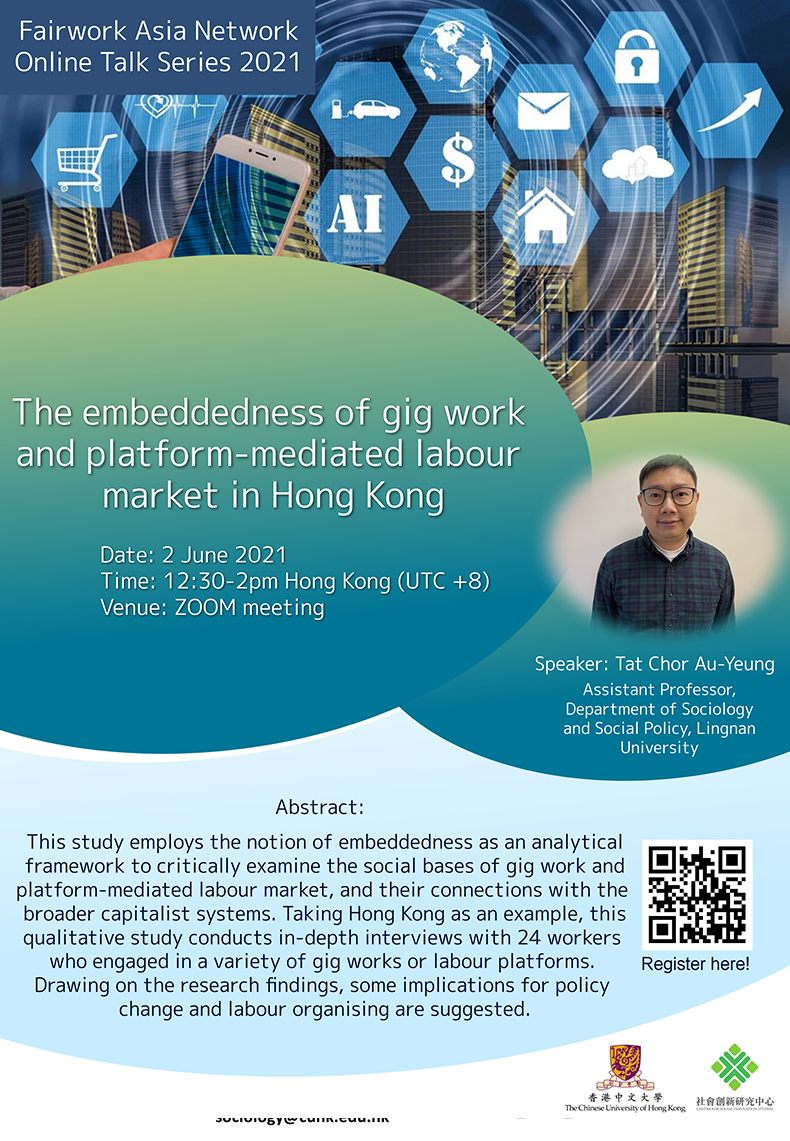 This study employs the notion of embeddedness as an analytical framework to critically examine the social base of the gig work and platform-mediated labour market,
and their connections with broader capitalist systems.
Taking Hong Kong as an example,
this qualitative study conducts in-depth interviews with 24 workers who are engaged in a variety of gig work or labour platforms.
Drawing on the research findings,
some implications for policy change and labour organising are suggested.
This study employs the notion of embeddedness as an analytical framework to critically examine the social base of the gig work and platform-mediated labour market,
and their connections with broader capitalist systems.
Taking Hong Kong as an example,
this qualitative study conducts in-depth interviews with 24 workers who are engaged in a variety of gig work or labour platforms.
Drawing on the research findings,
some implications for policy change and labour organising are suggested. |
|
|
Centre for Youth Studies
PROcruit C Social Innovation Learning from Oxford 29 June & 8 September 2021 | Online |
|
|
In collaboration with Oxford University’s Skoll Centre for Social Entrepreneurship,
an online course was delivered to help first-time jobseekers delve deeper into the world of social innovation.
Social innovators and entrepreneurs walked through the 5W1H of social innovation -- WHAT it is,
WHY it is important, WHO social innovators are, WHERE it can happen, and HOW you can be part of the change.
|
|
|
In collaboration with LinkedIn, a webinar titled “What is the future of skills and how to sharpen your professional profile” was delivered to help jobseekers
(1) curate their own digital learning journey through the understanding of the future of work capability and in particular for the caring professional; and
(2) establish/uplift their own professional profile for future employability.
|
|
|
Economic Reseach Centre
International Student Summit 2021: Economic Analysis of Public Policy 29 May & 26 June 2021 | Online |
|
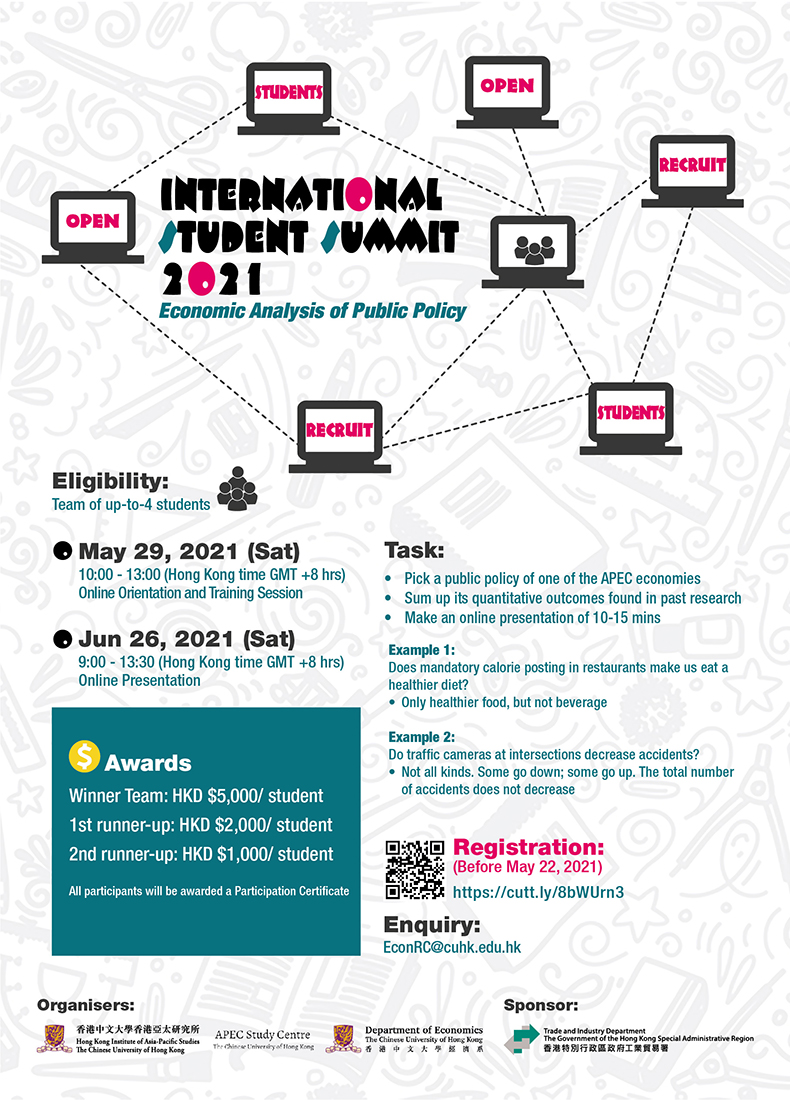 The International Student Summit 2021 aims to bring students with different degree majors around the world together to study policies from an economics perspective.
Prof. Travis K. H. Ng provided analysis training to the participants and helped them to grasp the idea of how to analyse a policy from an economics perspective,
using concrete examples and illustrations.
Fourteen teams participating in the International Student Summit 2021 presented their work in under ten minutes and were asked questions by the judges of the panel.
Dr Vinci Chow and Dr Wallace Mok from the CUHK Department of Economics were invited to be panel judges.
It was expected that the participants could gain more experience and knowledge from other teams as well as from the judges’ comments.
The International Student Summit 2021 aims to bring students with different degree majors around the world together to study policies from an economics perspective.
Prof. Travis K. H. Ng provided analysis training to the participants and helped them to grasp the idea of how to analyse a policy from an economics perspective,
using concrete examples and illustrations.
Fourteen teams participating in the International Student Summit 2021 presented their work in under ten minutes and were asked questions by the judges of the panel.
Dr Vinci Chow and Dr Wallace Mok from the CUHK Department of Economics were invited to be panel judges.
It was expected that the participants could gain more experience and knowledge from other teams as well as from the judges’ comments.
|
|
|
Speaker
Ms. Siti Nurjanah |
Director of the Women and Youth Development Institute of Indonesia,
Indonesia Chapter of Women’s Learning Partnership
|
|
Moderator
Prof. Jing Song |
Assistant Professor, Gender Studies Programme, CUHK |
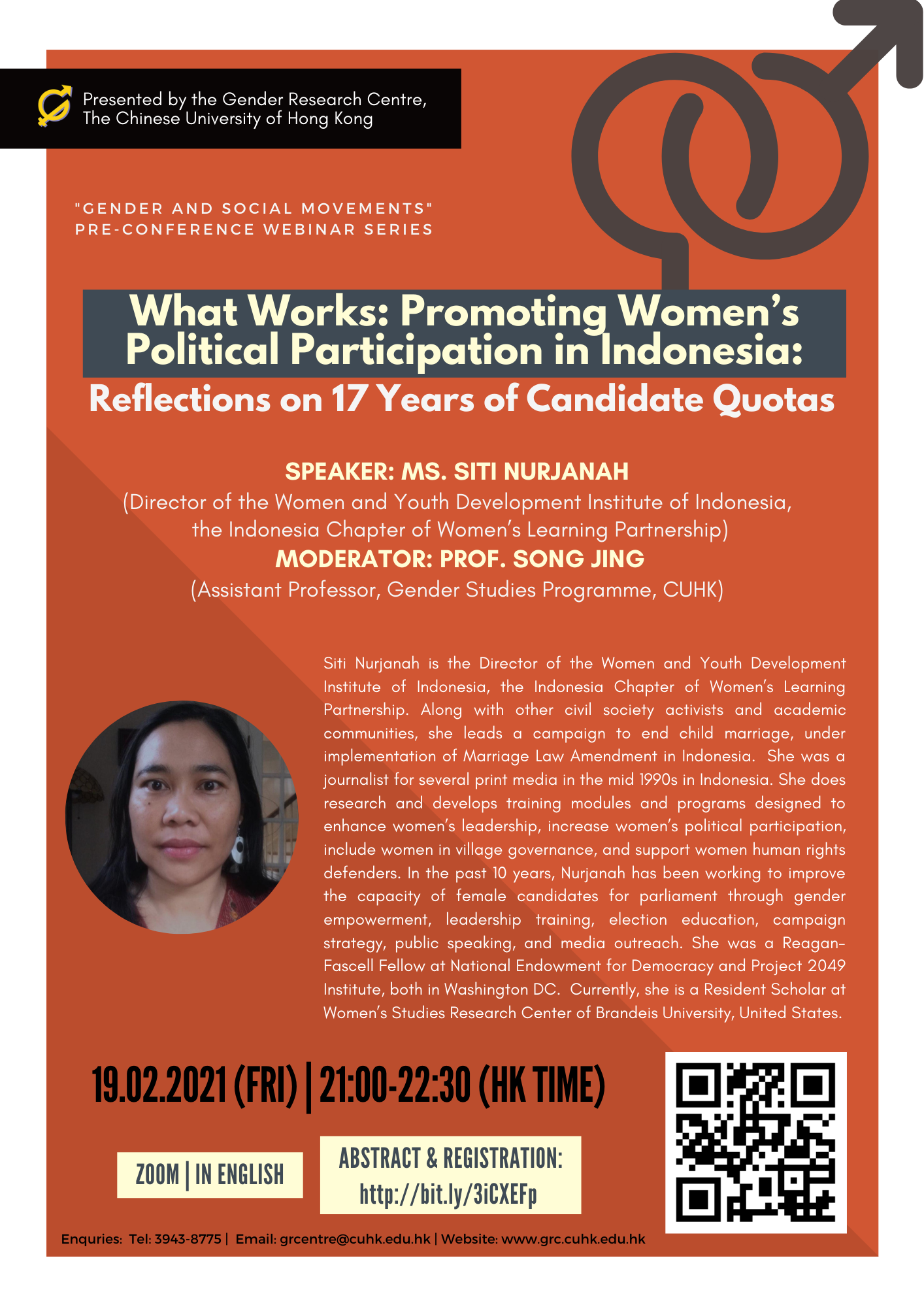 In Indonesia, a law mandating quotas for women in parliament was passed in 2003.
More than a decade later, in 2014,
Indonesia’s Election Commission disqualified from participation in parliamentary elections any party that does not include at least one woman in every third position on the ballot.
In this presentation, the speaker discussed the political participation of women in Indonesia during the 17 years since the enactment of the quota law.
The webinar was attended by 30 participants.
In Indonesia, a law mandating quotas for women in parliament was passed in 2003.
More than a decade later, in 2014,
Indonesia’s Election Commission disqualified from participation in parliamentary elections any party that does not include at least one woman in every third position on the ballot.
In this presentation, the speaker discussed the political participation of women in Indonesia during the 17 years since the enactment of the quota law.
The webinar was attended by 30 participants.
|
|
|
Speaker
Dr Shilpa Phadke |
Associate Professor, School of Media and Cultural Studies,
Tata Institute of Social Sciences, Mumbai
|
|
Moderator
Prof. Sealing Cheng |
Associate Professor, Department of Anthropology, CUHK |
|
Co-organizer
Gender Studies Programme, CUHK |
|
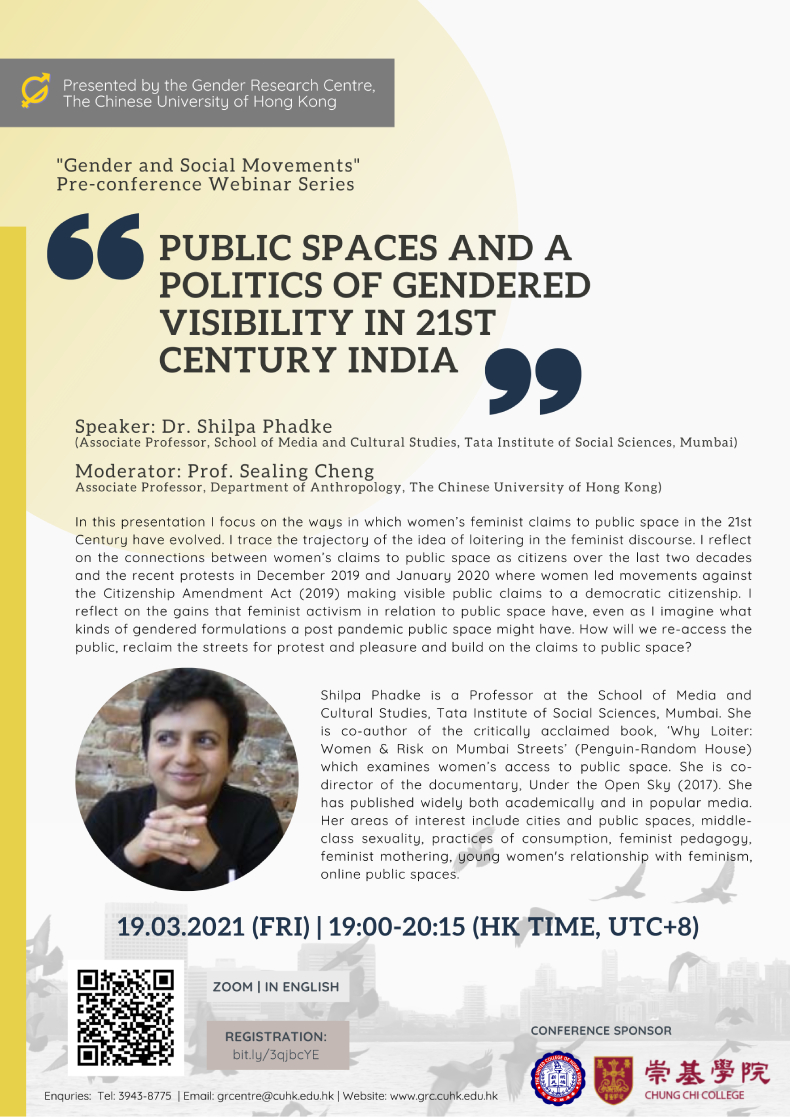 In this presentation the speaker focuses on the ways in which women’s feminist claims to public space in the 21st Century have evolved.
I trace the trajectory of the idea of loitering in feminist discourse.
I reflect on the connections between women’s claims to public space as citizens over the last two decades and the recent protests in December 2019 and January 2020 in India,
where women led movements against the Citizenship Amendment Act (2019) making visible public claims to a democratic citizenship.
I reflect on the gains that feminist activism in relation to public space have had,
even as I imagine what kinds of gendered formulations a post pandemic public space might be.
The presentation investigates, how will women re-access the public,
reclaim the streets for protest and pleasure and build on the present claims to public space?
In this presentation the speaker focuses on the ways in which women’s feminist claims to public space in the 21st Century have evolved.
I trace the trajectory of the idea of loitering in feminist discourse.
I reflect on the connections between women’s claims to public space as citizens over the last two decades and the recent protests in December 2019 and January 2020 in India,
where women led movements against the Citizenship Amendment Act (2019) making visible public claims to a democratic citizenship.
I reflect on the gains that feminist activism in relation to public space have had,
even as I imagine what kinds of gendered formulations a post pandemic public space might be.
The presentation investigates, how will women re-access the public,
reclaim the streets for protest and pleasure and build on the present claims to public space? |
|
|
Speakers
Prof. Rachel L. Einwohner |
Professor of Sociology, Purdue University, United States
|
Dr Fidelma Ashe
|
Reader, School of Applied Social and Policy Science,
Ulster University, United Kingdom |
|
Prof. Olena Nikolayenko |
Professor of Political Science, Fordham University, United States
|
|
Prof. Susanne Y. P. Choi |
Professor, Department of Sociology, CUHK
|
|
Prof. Sealing Cheng |
Associate Professor, Department of Anthropology, CUHK |
|
Prof. Ruby Y. S. Lai
|
Research Assistant Professor, Department of Sociology and Social Policy, Lingnan University
|
|
Dr Bárbara Fernández Melleda |
Assistant Professor in Latin American Studies,
School of Modern Languages and Cultures,
The University of Hong Kong
|
|
Prof. Ivy W. Wong |
Associate Professor, Gender Studies Programme, CUHK
|
|
Sponsors
Chung Chi College, CUHK United College, CUHK |
|
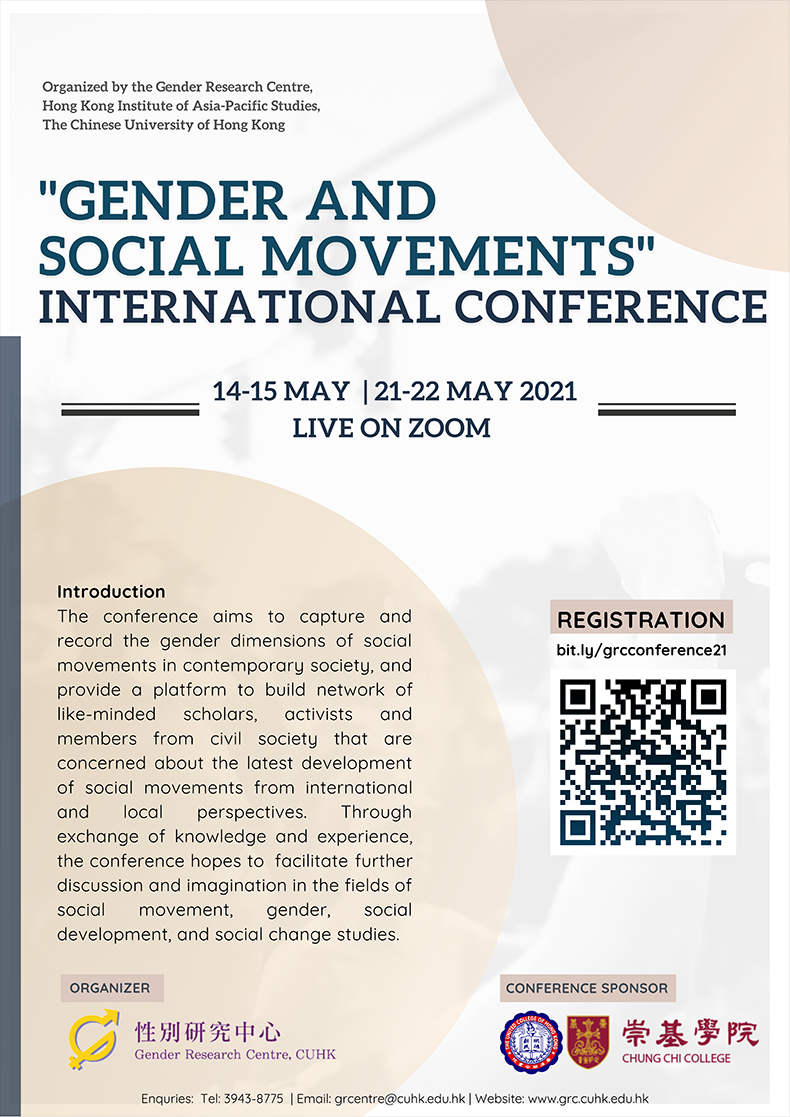 This conference aims to capture and record the gender dimensions of social movements in contemporary society,
and provide a platform to build a network of like-minded scholars,
activists and members from civil society that are concerned about the latest developments of social movements from international and local perspectives.
Through exchange of knowledge and experience,
the conference hopes to facilitate further discussion and imagination in the fields of social movement,
gender, social development, and social change studies.
You are cordially invited to attend the conference as an audience
This conference aims to capture and record the gender dimensions of social movements in contemporary society,
and provide a platform to build a network of like-minded scholars,
activists and members from civil society that are concerned about the latest developments of social movements from international and local perspectives.
Through exchange of knowledge and experience,
the conference hopes to facilitate further discussion and imagination in the fields of social movement,
gender, social development, and social change studies.
You are cordially invited to attend the conference as an audienceFor details: https://grcconference2021.com/ |
|
|
Speaker
Dr Yiling Luo |
Postdoctoral Fellow, Department of Geography and Resource Management, CUHK |
|
Co-organizer
Department of Geography and Resource Management, CUHK |
|
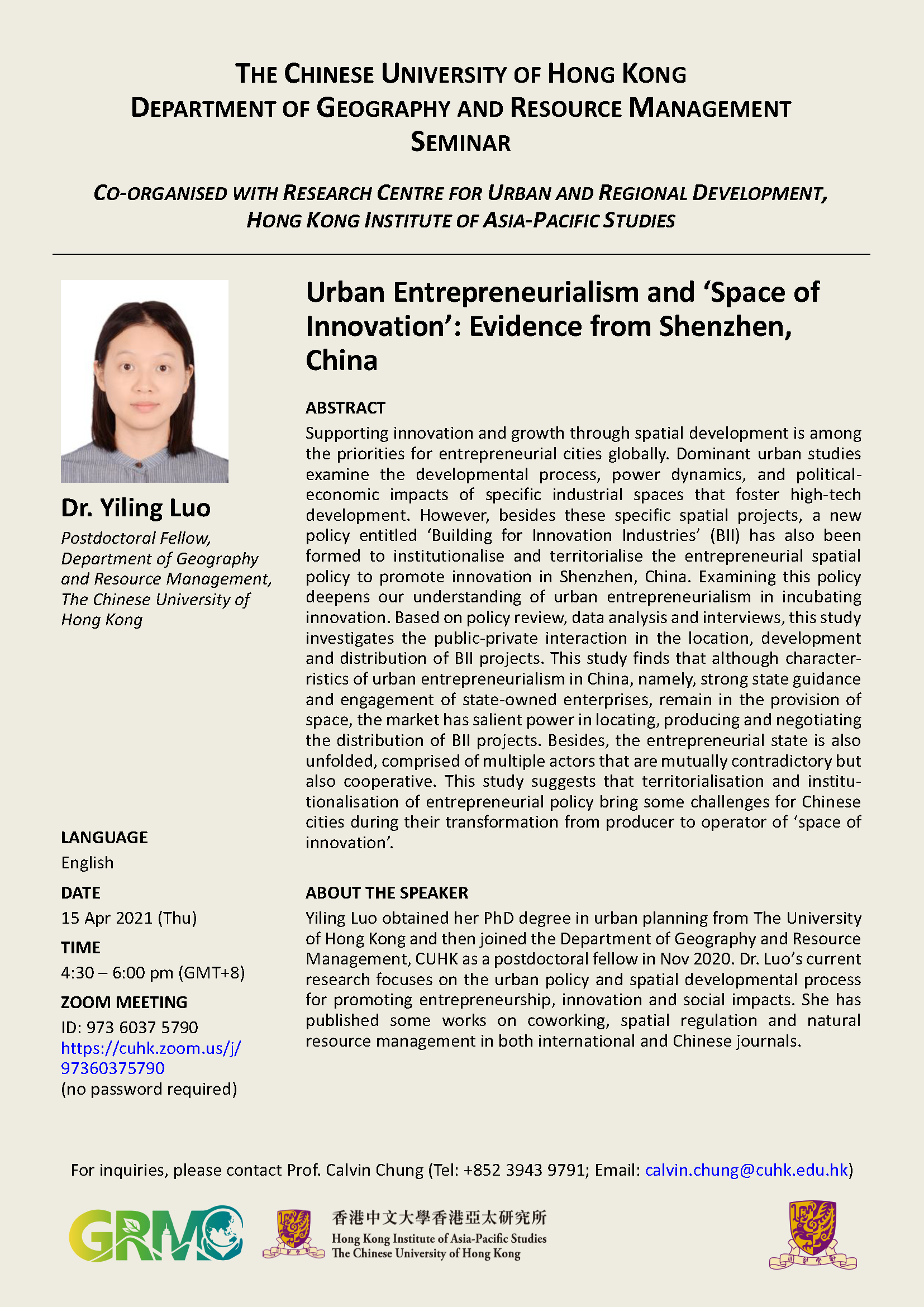 In this seminar, Dr Luo introduced her study of the new “Building for Innovation Industries” (BII) policy.
The institutionalization and territorialization of entrepreneurial spatial policy expand the understanding of urban entrepreneurialism in incubating innovation.
The findings reveal the salient power of the market in locating, producing and negotiating the distribution of BII projects in Shenzhen,
although state guidance and SOE engagement are strong.
The operation of mutually contradictory although cooperative relationships among multiple actors was also discussed.
In this seminar, Dr Luo introduced her study of the new “Building for Innovation Industries” (BII) policy.
The institutionalization and territorialization of entrepreneurial spatial policy expand the understanding of urban entrepreneurialism in incubating innovation.
The findings reveal the salient power of the market in locating, producing and negotiating the distribution of BII projects in Shenzhen,
although state guidance and SOE engagement are strong.
The operation of mutually contradictory although cooperative relationships among multiple actors was also discussed. |
|
|
Speaker
Dr Xianchun Zhang |
Assistant Professor, Department of Land Management, Zhejiang University
|
|
Co-organizer
Department of Geography and Resource Management, CUHK |
|
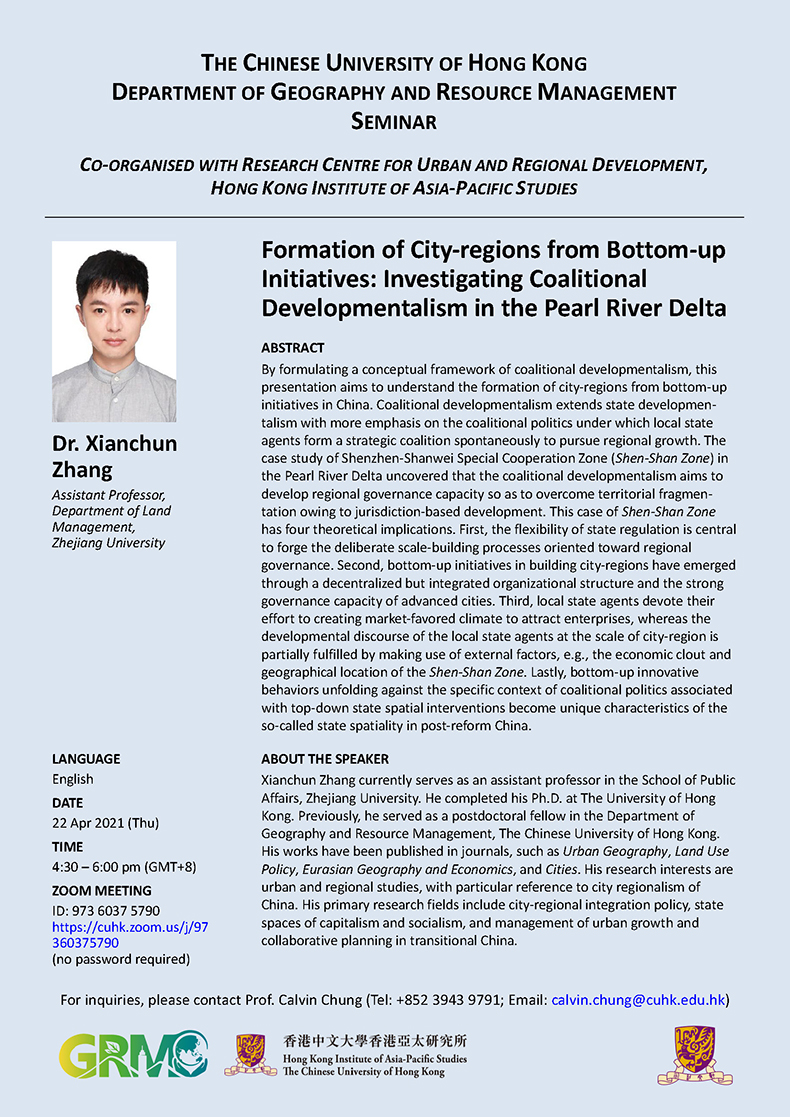 Through a conceptual framework of coalitional developmentalism,
this presentation aims to understand the formation of city-regions from bottom-up initiatives in China.
Coalitional developmentalism extends state developmentalism with more emphasis on the coalitional politics,
under which local state agents form strategic coalitions spontaneously to pursue regional growth.
The case study of Shenzhen-Shanwei Special Cooperation Zone (Shen-Shan Zone) in the Pearl River Delta uncovered that the coalitional developmentalism aims to develop regional governance capacity so as to overcome territorial fragmentation owing to jurisdiction-based development.
Through a conceptual framework of coalitional developmentalism,
this presentation aims to understand the formation of city-regions from bottom-up initiatives in China.
Coalitional developmentalism extends state developmentalism with more emphasis on the coalitional politics,
under which local state agents form strategic coalitions spontaneously to pursue regional growth.
The case study of Shenzhen-Shanwei Special Cooperation Zone (Shen-Shan Zone) in the Pearl River Delta uncovered that the coalitional developmentalism aims to develop regional governance capacity so as to overcome territorial fragmentation owing to jurisdiction-based development. |
|
|
Speakers
Prof. Sora Kim |
Associate Professor, School of Journalism and Communication, CUHK
|
|
Prof. Xiaojing Sheng |
Associate Professor, Department of Marketing,
University of Texas Rio Grande Valley, United States
|
|
Prof. Kang Hoon Sung |
Associate Professor, Department of Communication,
California State Polytechnic University, United States
|
|
Moderator
Prof. Fanny M. Cheung |
Senior Advisor, Faculty of Social Science & HKIAPS, CUHK |
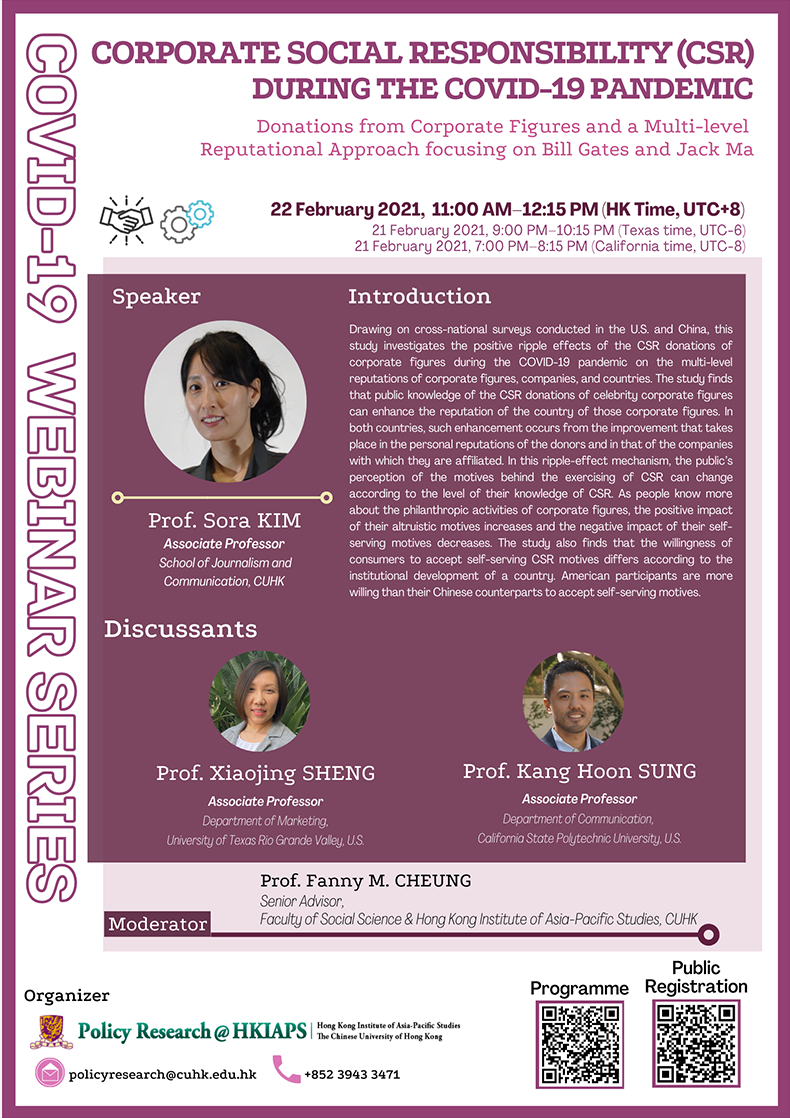 In this webinar,
Prof. Sora Kim investigated the positive ripple effects of CSR donations from corporate figures during the COVID-19 pandemic on the multi-level reputations of corporate figures,
companies, and countries.
Prof. Kim found that public knowledge of CSR donations of celebrity corporate figures can enhance the reputation of the country of those corporate figures.
She also shared that the willingness of consumers to accept self-serving CSR motives differs according to the institutional development of a country.
In this webinar,
Prof. Sora Kim investigated the positive ripple effects of CSR donations from corporate figures during the COVID-19 pandemic on the multi-level reputations of corporate figures,
companies, and countries.
Prof. Kim found that public knowledge of CSR donations of celebrity corporate figures can enhance the reputation of the country of those corporate figures.
She also shared that the willingness of consumers to accept self-serving CSR motives differs according to the institutional development of a country. |
|
|
Speakers
Prof. Ying-yi Hong |
Professor, Department of Management, CUHK Business School
|
|
Dr Hongchuan Shen
|
Postdoctoral Fellow, Department of Decision Sciences & Managerial Economics,
CUHK Business School
|
|
Prof. Tian Xie
|
Associate Professor, College of Business, Shanghai University of Finance & Economics
|
|
Moderator
Prof. Fanny M. Cheung |
Senior Advisor, Faculty of Social Science & HKIAPS, CUHK |
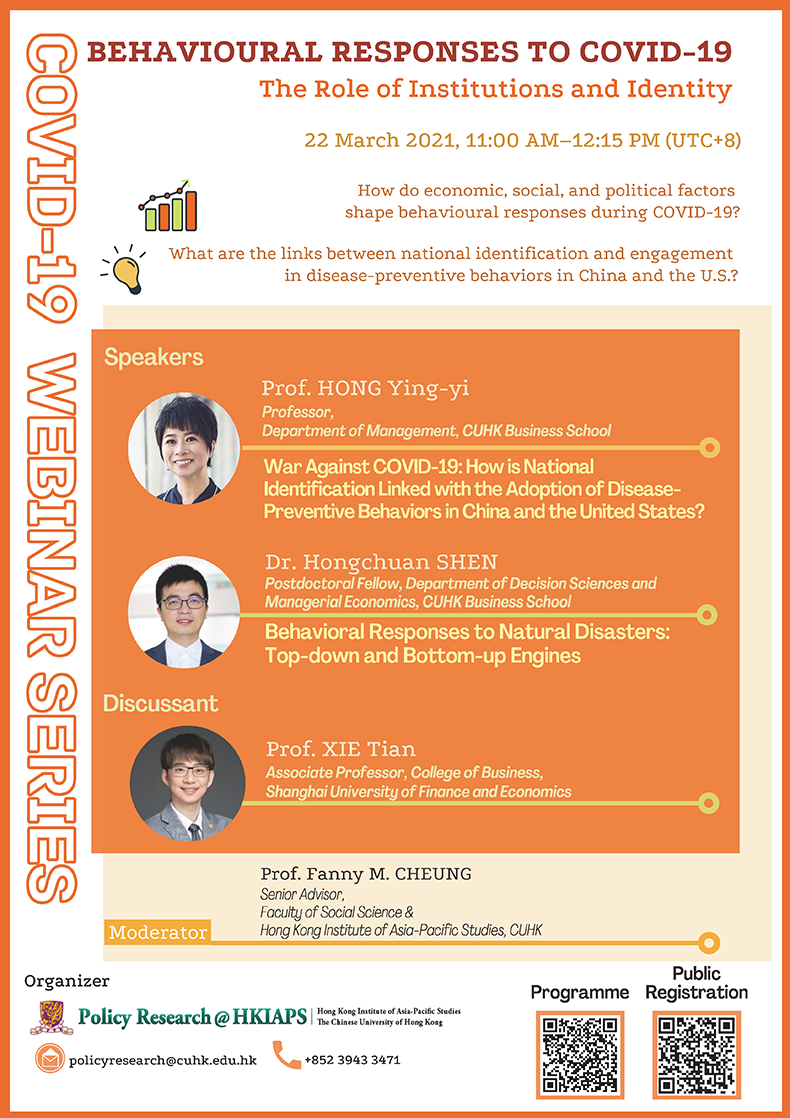 In this talk, the speakers shared their views about the role of institutions and identity in shaping our behavioural responses to COVID-19,
and explored how economic, social, and political factors have shaped behavioural responses during COVID-19.
The links between national identification and engagement in disease-preventive behaviours in China and the U.S. were examined.
The Behavioural Responses to Natural Disasters of Chinese individuals from the top down (formal) and bottom up (informal) aspects were also discussed.
In this talk, the speakers shared their views about the role of institutions and identity in shaping our behavioural responses to COVID-19,
and explored how economic, social, and political factors have shaped behavioural responses during COVID-19.
The links between national identification and engagement in disease-preventive behaviours in China and the U.S. were examined.
The Behavioural Responses to Natural Disasters of Chinese individuals from the top down (formal) and bottom up (informal) aspects were also discussed. |
|
|
Speakers
Prof. Bo Huang |
Professor, Department of Geography and Resource Management, CUHK
|
|
Prof. Paul K. S. Chan
|
Chairman and Professor (Clinical), Department of Microbiology, CUHK
|
|
Prof. Martin C. S. Wong
|
Professor, The Jockey Club School of Public Health and Primary Care, CUHK
|
|
Moderator
Prof. Fanny M. Cheung |
Senior Advisor, Faculty of Social Science & HKIAPS, CUHK |
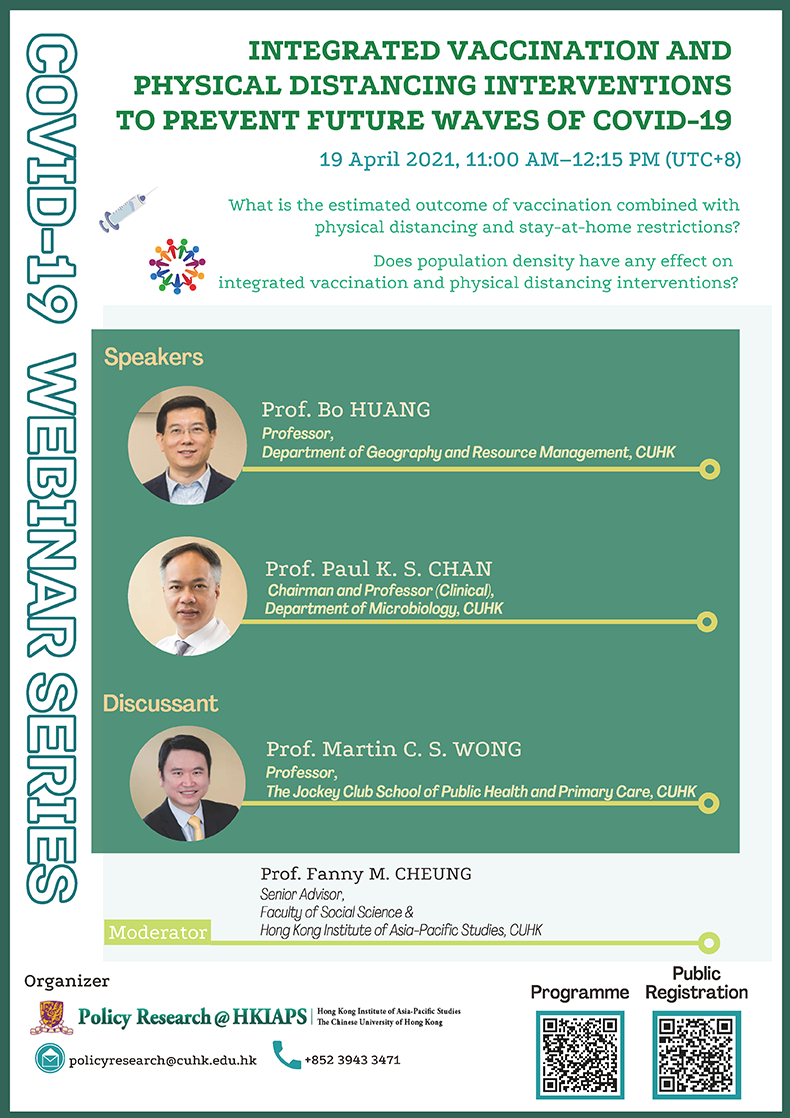 In this webinar, the speakers shared their latest research on the estimated preventative outcomes of vaccination combined with physical distancing and stay-at-home restrictions.
The effect of population density on integrated vaccination and physical distancing interventions was also discussed.
Prof. Huang shared the combined effects of vaccination and physical distancing with respect to a city’s population density and social contact patterns.
Prof. Chan shared his study on vaccine acceptance in Hong Kong.
Prof. Wong discussed the implications on healthcare policies.
In this webinar, the speakers shared their latest research on the estimated preventative outcomes of vaccination combined with physical distancing and stay-at-home restrictions.
The effect of population density on integrated vaccination and physical distancing interventions was also discussed.
Prof. Huang shared the combined effects of vaccination and physical distancing with respect to a city’s population density and social contact patterns.
Prof. Chan shared his study on vaccine acceptance in Hong Kong.
Prof. Wong discussed the implications on healthcare policies. |
|

